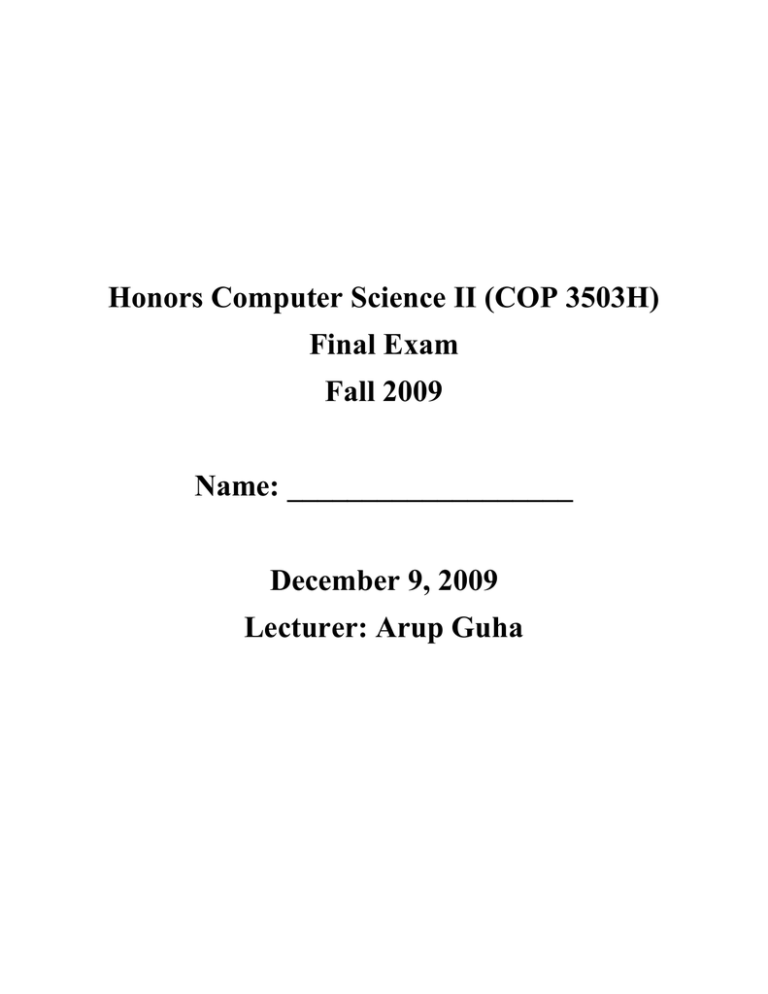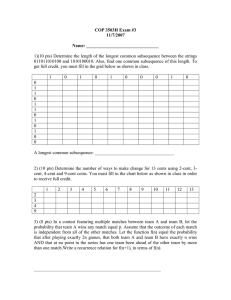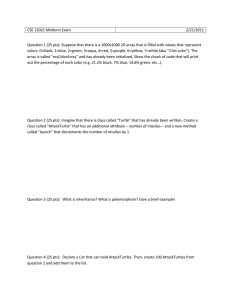Honors Computer Science II (COP 3503H) Final Exam Fall 2009
advertisement

Honors Computer Science II (COP 3503H)
Final Exam
Fall 2009
Name: ___________________
December 9, 2009
Lecturer: Arup Guha
1) (5 pts) What is the fewest number of comparisons needed to sort an array of 9 comparable
items? (Hint: 217 = 131072.)
2) (10 pts) Find the length of the longest common subsequence between “GACATATAGGA”
and “AGCATTACGAG” utilizing the dynamic programming algorithm shown in class. In order
to get full credit, you have to fill in the matrix provided below.
G
A
G
C
A
T
T
A
C
G
A
G
A
C
A
T
A
T
A
G
G
A
3) (10 pts) In the analysis of the average case run time of Quick Sort, if we let T(n) represent the
average the average case run time of Quick Sort on an array of n items, we end up with the
following recurrence:
, T(1) = 1
Come up with an appropriate substitution to simplify this equation (let S(n) equal something),
then solve for S(n) and ultimately find an asympototic solution for T(n). (Hint: The sum 1 + ½ +
1/3 +… 1/n is approximately ln n.) Note: you may solve the problem directly, without the
substitution, if you wish.
4) (10 pts) Utilize the dynamic programming algorithm shown in class to solve the 0-1 knapsack
problem to determine the most valuable knapsack of weight 13 utilizing the items below:
Item
A
B
C
D
E
F
Include 1
A
B
C
D
E
F
Weight
5
3
6
2
8
4
2
3
4
5
Value
107
60
140
35
180
93
6
7
8
9
10
11
12
13
5) (9 pts) Order the following functions from smallest to largest based on big-theta notation.
Assume that the base of all logarithms below is 2.
n2 ,
n4
n4
,
, n lg 2 n, lg( n n ), n1.0001,1.6 2 n ,2.5 n , (lg n) lg n
lg 2 n lg 5 n
_________ , __________ , _________ , __________ , _________ ,
_________ , __________ , _________ , __________
6) (15 pts) The subset sum problem is solvable by a greedy algorithm in certain situations. In
particular, if a set is a super-increasing set, then a greedy algorithm can be used to solve the
problem. A super increasing set {s1, s2, s3, …, sn} is one such that for each integer k (1 ≤ k < n),
< sk+1. Give an example of a super-increasing set of 10 integers, an achievable target
value, and a greedy algorithm that solves the subset sum problem for these special sets. Prove the
correctness
of
your
algorithm.
7) (15 pts) Determine the fewest number of multiplications to calculate the product ABCDE, for
matrices A, B, C, D, E with the following dimensions:
Matrix
A
B
C
D
E
Dimensions
2x6
6x1
1x3
3x5
5x2
In order to get full credit you must fill out the chart below appropriately, as shown in class.
Please include your calculations below the chart.
A
B
C
D
E
A
0
X
X
X
X
B
C
D
E
0
X
X
X
0
X
X
0
X
0
8) (15 pts) A “spaced-out” subsequence of a sequence numbers is one where none of the adjacent
terms in the subsequence appear adjacently in the original sequence. For example, 3, 8, 2, 6 is a
“spaced-out” subsequence of 3, 2, 8, 5, 4, 3, 2, 9, 6, 5, since none of the underlined terms are
adjacent. Your job is to write a method that returns the maximum sum of any “spaced-out”
subsequence of a sequence of numbers. The input sequence is stored in an integer array. The
method should work “fast enough” for an array of size 2000. Please fill out the method provided
below:
public static int maxSumSpaceSeq(int[] array) {
}
9) (10 pts) Consider doing a topological sort of ten items A, B, C, D, E, F, G, H, I and J with the
following constraints:
C before E
J before G
D before G
B before D
H before B
H before A
D before E
D before I
E before I
B before F
Start your Depth First Searches at A and go in alphabetical order. In any individual DFS, if you
have a choice, first explore the letter that comes first alphabetically. Show your work and give
the final answer of the topological sort with these rules.
____ , ____ , ____ , ____ , ____ , ____ , ____ , ____ , ____ , ____
10) (1 pt) The 1983 film Christmas Story portrays the plight of Ralphie who wants to get a BB
gun for which holiday?
_______________________________




